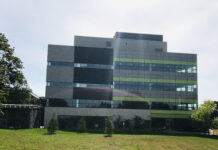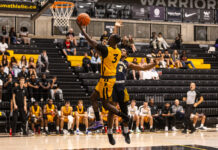The University of Waterloo recently held its first in-person convocations since fall 2019.
From June 14 to June 18, graduating students received their degrees or diplomas in the repurposed Physical Activities Complex. “It was really lovely, I didn’t feel like there was anything other than wearing masks that changed from what it was before,” said Lyne Baaj, who graduated this spring with a bachelor of science in psychology. “They really did think about how they could make it safe for us and I was really thankful.”
This year’s ceremonies also included special ceremonies for the classes of ‘20 and ‘21, whose convocations were disrupted by the pandemic.
Kaitlyn Bergsma, who graduated from UW in 2021, initially attended a virtual convocation. “On what was supposed to be my convocation day in 2021, I was actually on a road trip, so I got wifi and watched it from inside a van where I was living,” she said. Bergsma appreciated the effort put into her convocation, stating, “I think the faculty of engineering did a really good job given the circumstances. From what I heard from some of my friends in other faculties, what we got was very good in comparison.”
Lyndsay Eberlin, who graduated in 2020, had a different take on the convocation she received. “We got some videos… that was kind of it,” she summed up. “They didn’t really have a lot of time to switch everything over cause everything was so up in the air, so they did the best they could given the circumstances and given the fact that they’d never done an online ceremony in the past, but I was definitely still looking forward to having an in person ceremony at some point in the future after that… It was a little bit weird because we didn’t necessarily have a lot of closure for undergrad and I think it was a really big, important chapter in my life.”
Josh Goldschmidt, who also graduated in 2020, felt similarly dissatisfied with how his undergrad ended. “I’d describe it as unprepared and very hastily done… some things that I felt the convocation were missing were first of all the appearances of students. I think there might’ve been Renison student leadership, [but no] alumni and teachers I recognized,” he said. “I also got the distinct feeling that when they were preparing the Renison one, they had in mind that they were going to do a second one… ‘Give it a couple weeks and this’ll all blow over’, there was a lot of that feeling.”
Students of previous years also had differing opinions on whether or not they chose to attend the special in-person ceremonies held for the classes of ‘20 and ‘21.
Bergsma chose not to attend the in-person convocation, stating, “When I got the invite to come to in-person convocation, I decided not to go, mainly because I thought it was going to be a really long ceremony as they were combining a few faculties together. I knew a bunch of my close friends weren’t going either, so I opted not to go.”
Bergsma also felt as though she had achieved the objective of the in-person ceremonies. “For me, I took pictures on campus at the end of my 4B term, with gowns and stuff, so I felt like I already had closure at that point. I know some of my friends who went to the ceremony, they really appreciated it, but I still think it was good on Waterloo to hold those in-person events even if I wasn’t one of the people to attend.”
Meanwhile, Eberlin felt as if the event fulfilled the role that her previous convocation had not. “[The special in-person convocation] was really great, I think it was nice to finally walk across the stage, take some photos with family and friends; I think it helped with having some closure on my undergrad degree which was something I’d kinda missed having,” she said.
Goldschmidt also noted the lack of closure from his own convocation, and though he chose not to attend the special convocation, citing a lapse in communication as the main reason, Goldschmidt acknowledged the importance of the event. “[Though] even in the best of times, we don’t really care about school events, I know some of my friends went, and they really enjoyed it,” he said.































